 Petzlover
Petzlover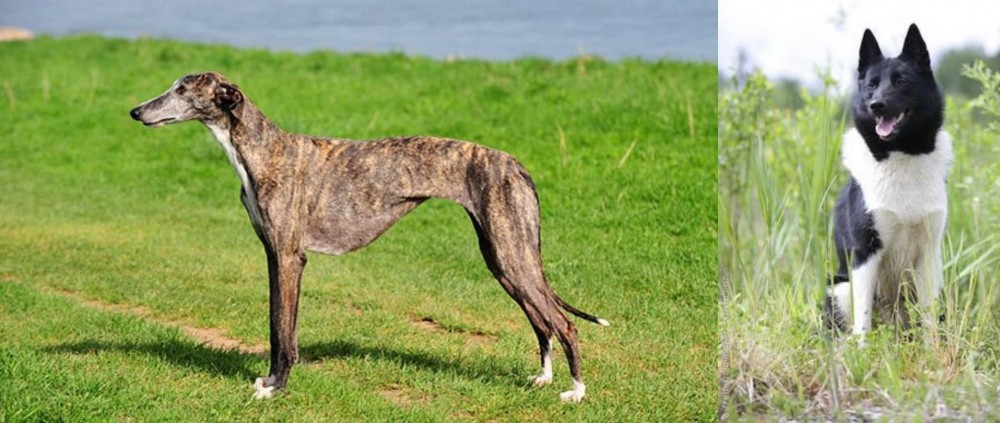 Galgo Espanol is originated from Spain but Russo-European Laika is originated from Russia. Galgo Espanol may grow 7 cm / 3 inches higher than Russo-European Laika. Galgo Espanol may weigh 6 kg / 14 pounds more than Russo-European Laika. Galgo Espanol may live 3 years more than Russo-European Laika. Both Galgo Espanol and Russo-European Laika has almost same litter size. Both Galgo Espanol and Russo-European Laika requires Low Maintenance.
Galgo Espanol is originated from Spain but Russo-European Laika is originated from Russia. Galgo Espanol may grow 7 cm / 3 inches higher than Russo-European Laika. Galgo Espanol may weigh 6 kg / 14 pounds more than Russo-European Laika. Galgo Espanol may live 3 years more than Russo-European Laika. Both Galgo Espanol and Russo-European Laika has almost same litter size. Both Galgo Espanol and Russo-European Laika requires Low Maintenance.
 Galgo Espanol means Spanish with galgo meaning greyhound, thus a Spanish Greyhound. This breed is ancient with their roots in perhaps the English greyhound and others in the sighthound family. They are much like the greyhound in that they are laid back, calm, gentle and quiet, unless they are competing on the local track. Like the greyhound they are shy and reserved; great with kids and other pets. And of course, they love cats.
Galgo Espanol means Spanish with galgo meaning greyhound, thus a Spanish Greyhound. This breed is ancient with their roots in perhaps the English greyhound and others in the sighthound family. They are much like the greyhound in that they are laid back, calm, gentle and quiet, unless they are competing on the local track. Like the greyhound they are shy and reserved; great with kids and other pets. And of course, they love cats.
There are dogs like the Galgo referred to in writing by the ancient Celts and Romans. One author, Arrian, had his own Galgos and used them when hunting. The breed flourished in the second half of the Middle Ages in Spain and well into the 8th century. When the Christians regained control of the Iberian Peninsula, they did away with the hunter old forms of hunting and introduced a new form with hounds that made the Galgo the pride of the aristocracy and not in the homes of the ordinary people. Arrian claim to two types of dogs, the smooth and rough coated.
Muslim and Chrisitan Kings kept Galgo Espanols. In all probability the Saluke and Galgo were crossbred at this time. It was illegal to kill a Galgo and in 1081, the Mayor of Cartuario of Slonza left his Galgo in his will to Diego Citid. Dogs seen in painting from the 12th century look just like dogs of this breed who can be seen today.
It is believed that when the Galgo was developed, it was in the midsection of Spain or the Castillian plains. They ruled the interior of the country while the bloodhound ruled the exterior. The 18th and 19th centuries saw very little change in the breed. However, in the 20th century, there was cross breeding with the English greyhound that produced a leaner, faster and powerful track racing dog. The results was a faster dog without the long distance stamina of the pure Galgo. For this reason, the breeders returned to breeding the pure professional racing dog.
The sport of racing the Galgo earns Spain around sixty million dollars per year. They train anywhere from three to four thousand of the Galgos every year for Open Field Coursing Championships. Still, there no longer is any cross breeding between the Greyhound and the Galgo. The current coursing programs feature a hare that is much hardier and difficult to pursue so the stamina of the old Galgo Espanol is desired. In Castile, where these games are played, the landscape is open with large fields that requires that the hare travels far greater distances. This means that the stamina of the original Galgo Espanol is needed.
When not racing the Galgos have become great house pets. They have a reputation as gentle dogs that are docile and quiet, with good health. This reputation is well earned. They are also successful show dogs in Europe much more than the states. This is perhaps because they are really rare outside of Spain. They are not recognized by the United Kennel Club nor the American Kennel Club.
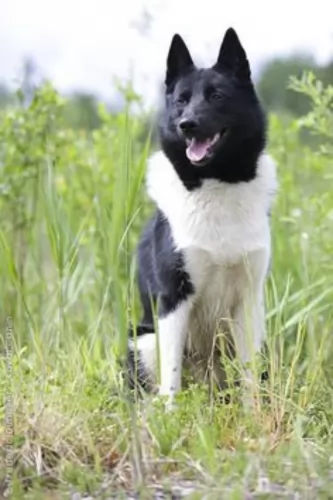 The Russo-European Laika is a hunting dog that comes from Russia.
The Russo-European Laika is a hunting dog that comes from Russia.
It is a dog that has been developed from Spitz type dogs. A breeding program was started for the dog in 1944.
The Russo-European Laika dog is recognized by the Federation Cynologique Internationale in the Spitz and Primitive type group.
 Obviously the Galgos looks a lot like the Greyhound, but in some very important ways they are very different. The rear of the Galgos is higher than the front and their muscle are flatter. They are built for endurance while the Greyhound is built for speed. The Galgos is a lighter, smaller dog with larger ear on a long head. They have long tails and their chests are not deep like the Greyhounds.
Obviously the Galgos looks a lot like the Greyhound, but in some very important ways they are very different. The rear of the Galgos is higher than the front and their muscle are flatter. They are built for endurance while the Greyhound is built for speed. The Galgos is a lighter, smaller dog with larger ear on a long head. They have long tails and their chests are not deep like the Greyhounds.
The Galgo comes in smooth and rough coats and a variety of colors. The rough coat protects dogs that are in climates colder than the ones in Spain and also keeps them from injuring their skin while running. The colors include brindle, black, golden, toasted, cinnamon, yellow, red, white, white with patches, or any color as long as they have a white forehead and muzzle.
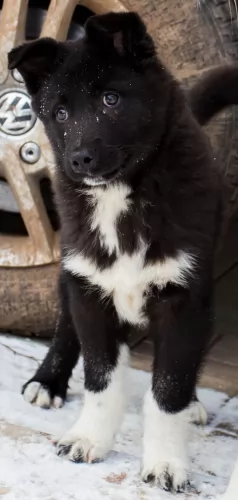 The Russo-European Laika is a medium sized dog Spitz dog that stands at between 54 to 60cm in height and weighs in the region of 20 – 23kg.
The Russo-European Laika is a medium sized dog Spitz dog that stands at between 54 to 60cm in height and weighs in the region of 20 – 23kg.
The dog has quite a strong resemblance to the Karelia Bear Dog. They are sometimes mistaken for each other.
The Russo-European Laika has the typical triangular shaped head with small dark eyes, a black nose and erect, pointed ears. These are deep chested dogs.
As with other Spitz breeds, this dog has a thick fur with a densely furred tail which is curved over the back. The double coat is fairly long and usually a dark grey color or black with some white markings. Sometimes the dog has a white coat.
This is a lively, energetic dog breed that loves to spend time outdoors. It has always been used to alert hunters to prey, using its bark to alert the hunter.Training and socialization will be necessary for the dog if you don’t want it to be barking in the house too.
He makes an excellent guard dog, protecting his human family. It is very tolerant of children too, getting on well with them as well as other pets.
The dog is known for being totally devoted to its family, being an affectionate and loyal breed that doubles as a family pet and guard dog.
 They are good with children, but you need to be careful no one gets knocked down or hurt.
They are good with children, but you need to be careful no one gets knocked down or hurt.
Stamina for running and a good record in lure coursing.
Though they can be couch potatoes like greyhounds they are better off with a fenced yard and not an apartment.
They are smart and can learn anything you want to teach them if you can keep their attention.
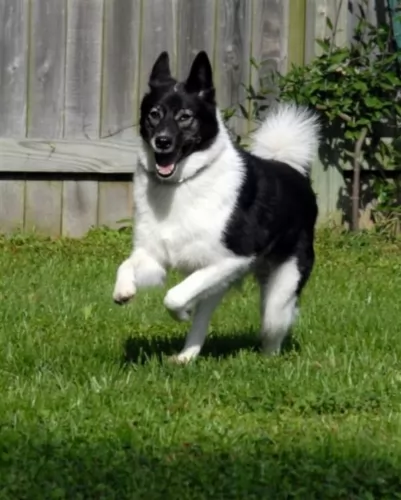 This is an intelligent dog breed, loving the time he spends with his human family but reluctant to be patted by strangers.
This is an intelligent dog breed, loving the time he spends with his human family but reluctant to be patted by strangers.
They also get along with pets that they have grown up with. They get on well with kids and make great watchdogs too. Small wonder they make such sought after pets and companions.
 Being a large dog, the Galgo Espanol would normally face a high probability of hip dysplasia. Fortunately for the breed this is not true. In this respect their lightness of weight, their history as a working dog and their anatomy have protected them from it. They are however susceptible to other issues.
Being a large dog, the Galgo Espanol would normally face a high probability of hip dysplasia. Fortunately for the breed this is not true. In this respect their lightness of weight, their history as a working dog and their anatomy have protected them from it. They are however susceptible to other issues.
Malignant tumors that quickly spread throughout the body. Life threatening.
As a sighthound, the Galgo Espanol is prone to have issues anytime with anesthetics. They don’t metabolize the anesthetics like other dogs do. They will take longer to revive, and they are susceptible to hypothermia while under an aesthetic.
While running, they are prone to injuries
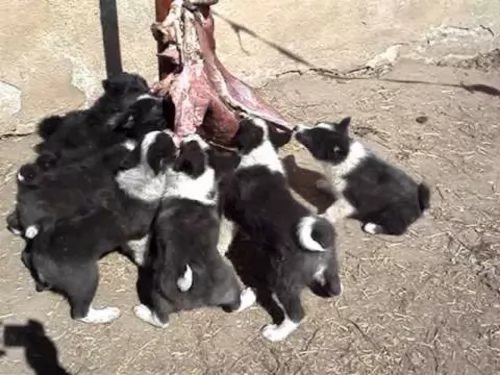 These Spitz type dogs are always known to enjoy good health, and owners don’t have to worry too much about their health as only a small number of health issues are reported with this healthy dog breed.
These Spitz type dogs are always known to enjoy good health, and owners don’t have to worry too much about their health as only a small number of health issues are reported with this healthy dog breed.
This is a congenital defect in the abdominal muscles and can result in fat or tissues being evident under the skin. A bulge is often seen in the area of the abdomen. Larger hernias will require surgery.
 Feed your puppy a high quality dry food made for large breed dogs. Feed 3 meals a day 2.5 to 3 cups total for the day.
Feed your puppy a high quality dry food made for large breed dogs. Feed 3 meals a day 2.5 to 3 cups total for the day.
Feed your adult Galgo a high quality dry food made for large breed dogs. Feed 2 meals a day but don’t overfeed Give 4-5 cups total for the day.
They have amazing stamina and good speed. Generally good health as a breed.
He can be a couch potato indoors and runs forever outdoors. He does need daily exercise and bedrest both. The best would be if you could sprint him every day or have a small yard he can play in. They excel of course at agility and lure coursing. Keep them on a leash because if they run you will never catch them. The American Sighthound Field Association presents lure coursing events that they are eligible for. They have exceled at show competition in Europe but are not well known in the U.S.
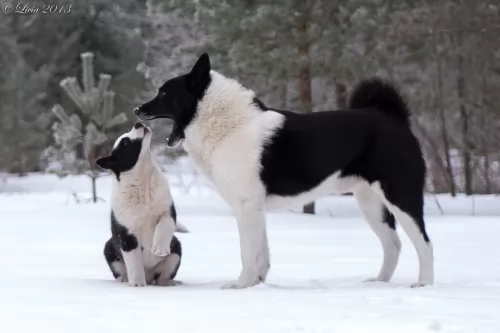 This is an energetic dog and will require a good amount of excerise. This dog isn’t suited to living in the city as they are highly active. Apart from wanting large grounds to run around in, he will need walks as well as ball- and rope games to keep him busy.
This is an energetic dog and will require a good amount of excerise. This dog isn’t suited to living in the city as they are highly active. Apart from wanting large grounds to run around in, he will need walks as well as ball- and rope games to keep him busy.
He is intelligent and needs some form of mental stimulation. There are good quality toys which one can buy for these dogs than can make them think.
Many things can change a dog’s longevity, and diet is one. A good nutritious diet with vitamins and minerals will give your dog less of a chance to get sick.
If you go for the best quality commercially manufactured dog foods, you’ll find that they are both convenient and well balanced.
To provide your dog with just a bit of variety in his diet, some home-made food added into the dry kibble from time to time will delight your pet.
No need to make preparing the food a huge issue either. Boil brown rice and chicken in a pot and add in sweet potatoes, carrots and spinach. Chop all this up and add small portions of it into the dry kibble.
Try to include a bit of raw meat occasionally and never let your dog be without a constant source of fresh, cool water